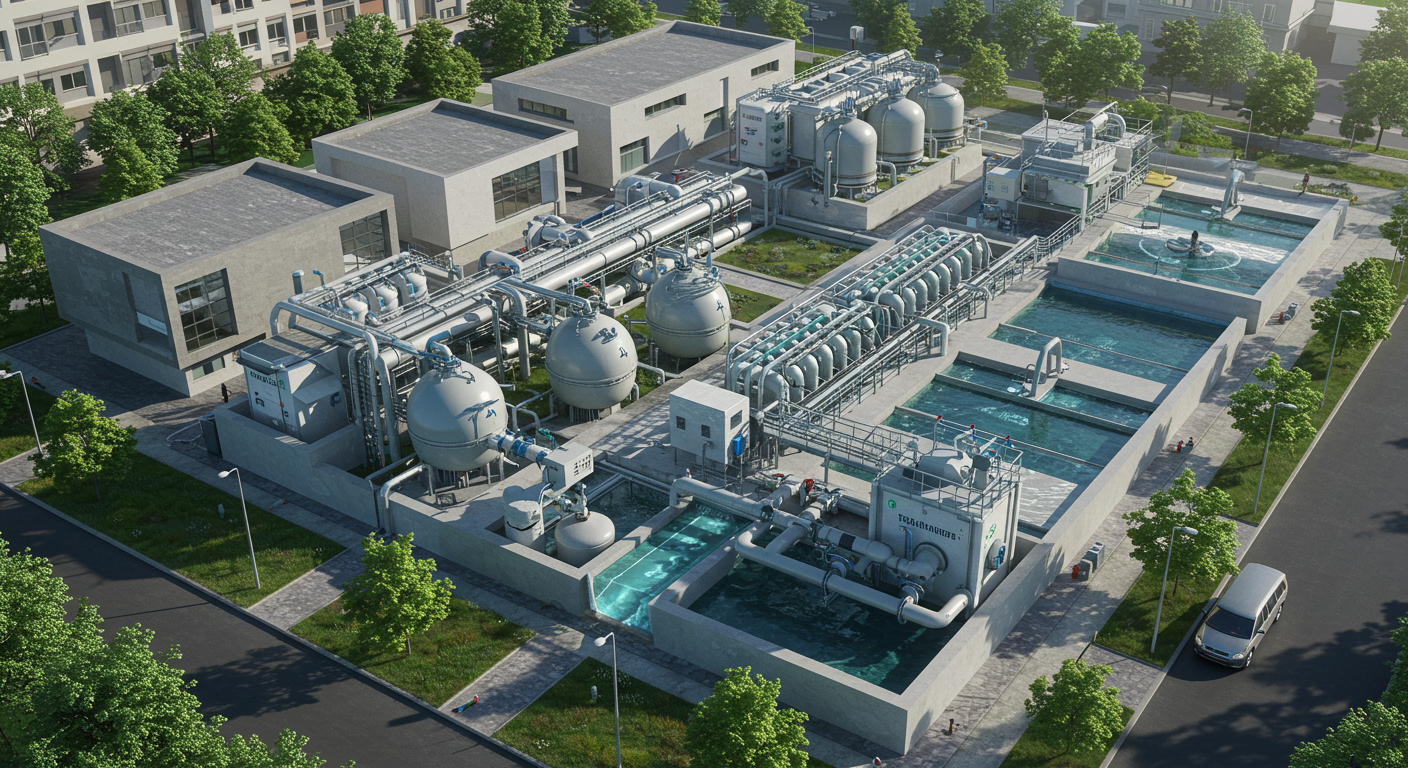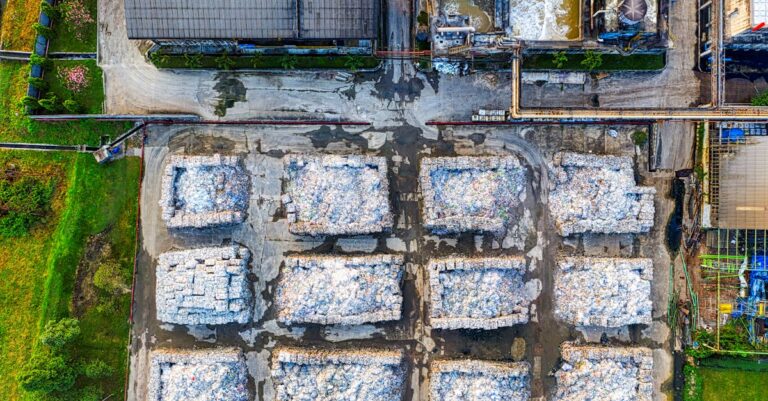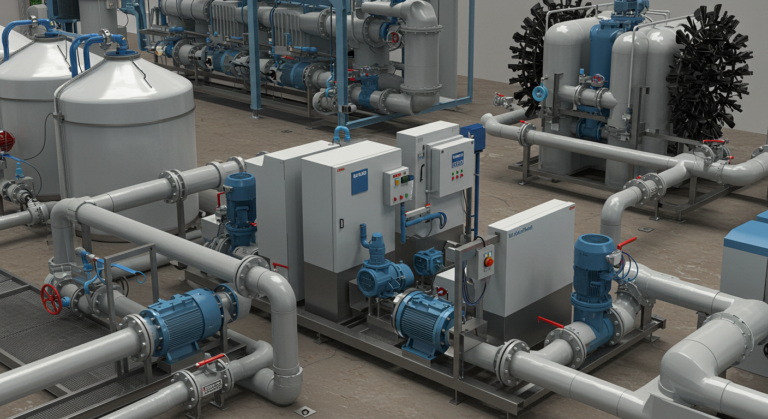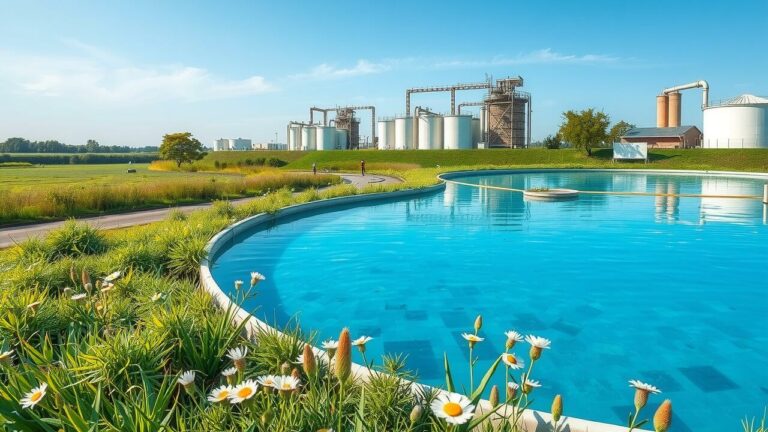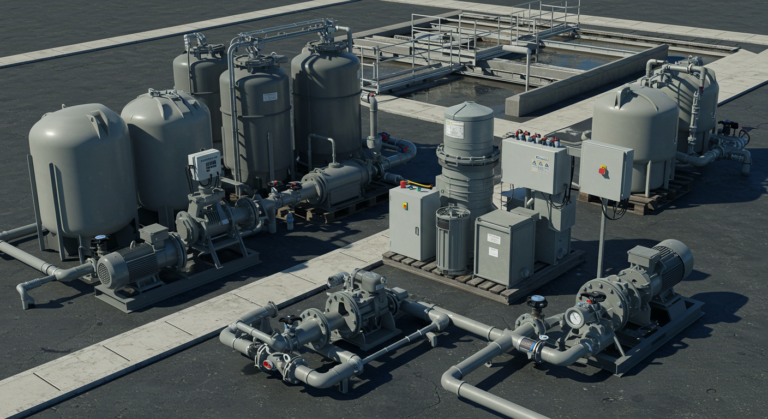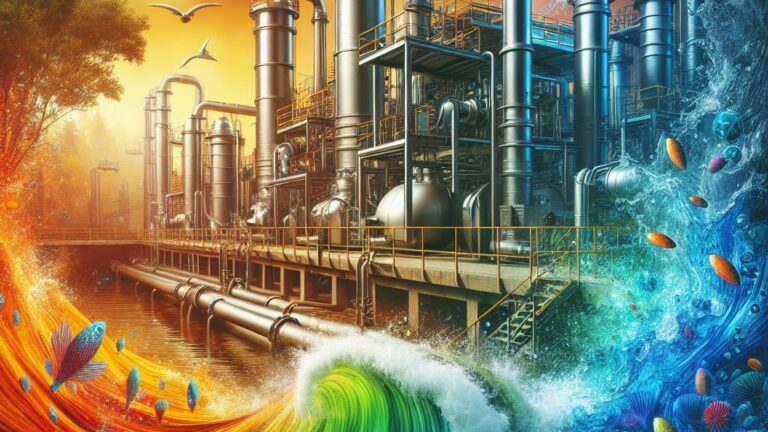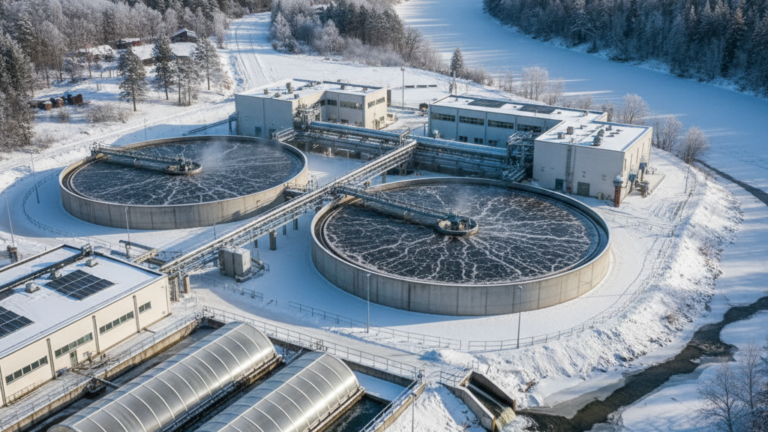Innovative Wastewater Treatment Solutions for Modern Facilities
Effective wastewater treatment is critical for both industrial and municipal applications, highlighting the need for Innovative Wastewater Treatment Solutions for Modern Facilities. These advanced solutions enable wastewater treatment facilities to efficiently manage and treat wastewater while minimizing environmental impacts. Various wastewater treatment systems are designed to handle the complexities of different types of wastewater, including household sewage and industrial effluents. The treatment of wastewater involves multiple stages to ensure that the resulting treated wastewater meets safety and quality standards before being released or reused. Municipal wastewater treatment facilities play a vital role in water and wastewater treatment by implementing sustainable practices that enhance wastewater management, promoting a healthier ecosystem. The integration of innovative technologies in these facilities elevates the effectiveness of wastewater treatment, ensuring compliance with regulations and supporting community well-being.
Innovative Wastewater Treatment Solutions for Modern Facilities | Importance of Effective Wastewater Treatment
Effective wastewater treatment is essential for maintaining environmental integrity and public health. The treatment of municipal wastewater, industrial wastewater, and domestic wastewater prevents the release of untreated wastewater into natural water bodies. Modern wastewater treatment plants employ Innovative Wastewater Treatment Solutions for Modern Facilities that are designed to efficiently process various types of sewage. These solutions not only enhance the quality of treated water but also facilitate wastewater reuse, promoting sustainability and resource conservation.
The role of decentralized wastewater treatment systems is increasingly recognized in addressing the challenges associated with traditional centralized facilities. Decentralized systems can be beneficial for communities with limited infrastructure, ensuring that municipal wastewater is treated effectively. Innovative Wastewater Treatment Solutions for Modern Facilities integrate advanced technologies that streamline the sewage treatment process. This results in reduced energy consumption, lower operational costs, and improved overall efficiency in wastewater management strategies.
Types of Wastewater: Industrial and Domestic
Industrial wastewater primarily originates from manufacturing processes and can contain harmful substances that pose risks to both human health and the environment. Efficient industrial wastewater treatment is crucial for mitigating these risks. Innovative wastewater treatment solutions for modern facilities often incorporate advanced technologies designed to process industrial wastewater effectively. This ensures that treated sewage meets regulatory standards before being discharged into sewage systems. Effective industrial wastewater treatment also helps in minimizing the generation of sewage sludge, further enhancing the sustainability of operations.
Domestic wastewater, on the other hand, is generated from residential areas and typically consists of water from bathrooms, kitchens, and laundry. This type of sewage often contains organic matter, nutrients, and pathogens. Wastewater surveillance in urban settings is vital for monitoring the quality of domestic sewage and ensuring adequate sewage treatment plants are in place. By utilizing comprehensive waste-water treatment methods, municipalities can transform raw sewage into treated sewage that can be reused or safely released back into the environment, thus promoting sustainable living practices.
Innovative Wastewater Treatment Systems
The need for effective waste treatment is critical in maintaining public health and environmental safety. Innovative Wastewater Treatment Solutions for Modern Facilities focus on transforming waste-water into clean water suitable for various applications, including clean drinking water. Advanced water treatment plants employ sophisticated techniques to address combined sewage overflow issues, ensuring that cleaner water is consistently available. These facilities integrate cutting-edge technologies to meet stringent regulations outlined in the Clean Water Act. By enhancing the efficiency of cleaning water processes, modern methodologies not only comply with environmental standards but also promote sustainable practices within communities.
Features of Modern Wastewater Treatment Plants
Modern wastewater treatment plants incorporate innovative wastewater treatment solutions for modern facilities, focusing on efficient water management and advanced technologies. These facilities utilize state-of-the-art processes for water recycling and water reclamation, which enhance sustainable waste management practices. By implementing automated monitoring systems, treatment plants can optimize the treatment process, effectively reducing the volume of sewage sludge produced while improving overall efficiency.
Various wastewater treatment innovations have led to the integration of biological and chemical treatments within these plants. The combination of anaerobic digestion and advanced oxidation processes allows for more effective breakdown of pollutants, ensuring compliance with environmental regulations. Wastewater treatment solutions are now designed not only for immediate treatment needs but also for long-term sustainability, making them essential components of progressive water management strategies in urban development.
The Role of Technology in Wastewater Management
Innovative wastewater treatment solutions for modern facilities rely heavily on advancements in wastewater treatment technologies. These innovations encompass a range of wastewater treatment options that enhance the efficiency and effectiveness of comprehensive wastewater treatment processes. By integrating alternative wastewater technologies, facilities can address numerous wastewater treatment challenges while promoting sustainable wastewater treatment practices. The implementation of smart monitoring systems and automation helps optimize operations, ensuring that modern sewage treatment solutions meet regulatory standards while minimizing environmental impact.
The collaboration between wastewater treatment companies and technology developers plays a critical role in shaping effective wastewater management solutions. Engaging with emerging wastewater treatment technology fosters a proactive approach to tackling the complexities of wastewater management. Facilities adopting these innovative strategies can efficiently manage resources and reduce operational costs, contributing to long-term sustainability. Emphasizing a forward-thinking mindset within the industry will lead to continued improvements in wastewater treatment practices, ultimately benefiting communities and ecosystems alike.
- Advanced sensor technologies enable real-time monitoring of water quality.
- Automation systems reduce the need for manual intervention, enhancing operational efficiency.
- Membrane filtration technologies improve contaminant removal from wastewater.
- Data analytics helps in predicting maintenance needs and optimizing treatment processes.
- Energy-efficient systems lower the operational costs associated with wastewater treatment.
- Smart irrigation systems utilize treated wastewater, promoting water conservation.
- Mobile applications facilitate better communication and management among wastewater treatment staff.
Industrial Wastewater Treatment Solutions
Effective wastewater management is crucial for both environmental sustainability and public health, particularly in the industrial sector. Innovative Wastewater Treatment Solutions for Modern Facilities play a pivotal role in ensuring wastewater treatment excellence. Leading wastewater treatment practices utilize advanced technologies that streamline the wastewater treatment process, making it more efficient and effective. This is essential not just for managing industrial wastewater but also for addressing the challenges posed by domestic wastewater treatment. By integrating alternative wastewater treatment methods, facilities can enhance wastewater treatment maintenance and optimize community wastewater treatment efforts. The evolution of wastewater technology continues to drive wastewater innovation, paving the way for a more sustainable future.
| Treatment Method | Description | Benefits |
|---|---|---|
| Activated Sludge Process | A biological treatment method that uses aeration and a microbial population to decompose organic matter in wastewater. | High efficiency in removing organic pollutants, reduces sludge production, and is adaptable to different wastewater types. |
| Membrane Bioreactor (MBR) | A combination of conventional biological treatment and membrane filtration to achieve high-quality effluent. | Produces high-quality treated water suitable for reuse, compact design, and reduced footprint compared to traditional methods. |
| Constructed Wetlands | A natural treatment system that uses wetland vegetation to filter and degrade pollutants in wastewater. | Low operational cost, enhances biodiversity, and supports ecosystem services while treating wastewater effectively. |
| Advanced Oxidation Processes (AOP) | A process that generates highly reactive hydroxyl radicals to break down complex organic pollutants. | Highly effective for treating difficult contaminants, reduces toxic compounds, and can be used in various industrial applications. |
Techniques for Efficient Industrial Wastewater Treatment
Efficient industrial wastewater treatment relies on robust wastewater management techniques that integrate various wastewater technologies. Modular wastewater treatment systems stand out for their flexibility, allowing industries to scale their operations in response to varying wastewater quantities and qualities. These top-tier wastewater treatment solutions enable seamless adjustments to meet regulatory standards while promoting sustainable wastewater management practices. A wastewater management system designed with innovative wastewater treatment solutions for modern facilities can greatly enhance industrial wastewater management.
Implementing distributed wastewater treatment approaches can lead to significant improvements in the efficiency of industrial wastewater treatment. This technique allows for localized treatment, reducing the strain on centralized wastewater utilities. Utilizing safe wastewater treatment methods ensures that harmful pollutants are effectively removed before discharge. Moreover, understanding the fundamentals of wastewater treatment facts can help organizations adopt best practices that enhance their operational sustainability. In this landscape, industrial facilities are increasingly turning to cutting-edge technologies that promise better performance and compliance.
Case Studies: Successful Industrial Wastewater Management
Successful industrial wastewater management relies heavily on innovative wastewater treatment solutions for modern facilities. One prominent case involved a large manufacturing plant that adopted advanced wastewater analysis techniques. By implementing modern sewage treatment processes, they effectively enhanced their industrial wastewater remediation efforts. This facility established sustainable wastewater infrastructure that not only improved compliance with regulations but also became a model for other organizations. The innovative wastewater schemes enabled wastewater reuse, allowing the facility to cut operational costs while contributing positively to the environment.
Another notable example features a food processing plant that transformed its wastewater utility through early wastewater management practices. By integrating energy-neutral wastewater facilities and leveraging cutting-edge wastewater technology facts, the facility significantly reduced its environmental footprint. The customized and efficient treatment systems developed ensured that industrial wastewater was treated effectively, aligning with best practices in the wastewater world. These advancements showcased how a proactive approach can lead to long-term benefits and establish a benchmark for future projects in the industry.
Municipal Wastewater Treatment Approaches
Effective wastewater treatment is crucial for addressing urban wastewater issues and ensuring compliance with stringent wastewater standards. Innovative wastewater treatment solutions for modern facilities must be implemented to adapt to the diverse characteristics of both process wastewater and mixed wastewater. These solutions not only enhance wastewater quality improvements but also promote wastewater recovery, driving sustainability in the wastewater sector. As municipalities navigate the complexities of sewage treatment systems, a focus on innovative technologies and best practices in wastewater management reminds stakeholders of the importance of efficient strategies to tackle challenges effectively.
Challenges in Municipal Wastewater Treatment
Municipal wastewater treatment faces multiple challenges that can hinder effective management. Significant wastewater pollution remains a critical issue, especially in urban areas like New York, where the volume of wastewater streams can overwhelm treatment plants. Many facilities struggle with hot wastewater, which can affect treatment efficiency and lead to moribund wastewater treatment processes. Innovative wastewater treatment solutions for modern facilities are essential to address these issues, providing advanced methods to enhance wastewater quality and reduce pollution.
Wastewater treatment consulting plays a vital role in identifying and resolving municipal challenges. Experts in the field develop strategies to improve the performance of wastewater plants, ensuring they meet regulatory standards while effectively managing the diverse nature of wastewater streams. As municipalities work to combat the wastewater pollution issue, integrating innovative wastewater treatment solutions becomes crucial. This approach not only helps in maintaining high wastewater quality but also promotes sustainable practices within urban environments.
Best Practices for Sustainable Municipal Wastewater Management
Sustainable municipal wastewater management requires a combination of innovative approaches and technologies. Innovative wastewater treatment solutions for modern facilities can effectively address the challenges posed by ever-changing wastewater contaminants. Public sewage facilities need to adopt membrane-based wastewater treatment, which enhances wastewater filtration and ensures that various individual wastewater streams are adequately treated. This process not only improves the quality of treated water but also minimizes the impact of wastewater discharge on the environment.
Establishing best practices involves the integration of innovative water treatment methods in city sewage facilities. Waste treatment facilities must continuously adapt to increasing wastewater volumes and diverse contaminants. Implementing routine monitoring and upgrading treatment processes are essential to maintain compliance with regulations. By prioritizing sustainable management practices, municipalities can optimize their treatment systems while ensuring a reliable and safe water supply for their communities.
| Best Practice | Description | Benefits |
|---|---|---|
| Membrane-based Treatment | Utilizing advanced filtration technologies for effective removal of contaminants. | Improves water quality and reduces environmental impact. |
| Routine Monitoring | Regular assessment of wastewater treatment processes for compliance with regulations. | Ensures safety and reliability in water supply. |
| Adaptation to Changing Contaminants | Implementing flexible treatment processes that can handle diverse types of pollutants. | Increases resilience against unexpected challenges in wastewater management. |
| Community Engagement | Involving the public in understanding wastewater issues and solutions. | Enhances public trust and support for wastewater management initiatives. |
Advanced Wastewater Treatment Innovations
The quest for effective Innovative Wastewater Treatment Solutions for Modern Facilities has led to the development of advanced systems capable of addressing various challenges in water management. Existing water treatment solutions now incorporate wastewater surveillance programs, notably in the U.S. wastewater surveillance initiatives that monitor quality and safety. As facilities grapple with overwhelmed sewage treatment systems, innovative approaches are imperative to handle both residential sewage water and industrial wastewater efficiently. Projects like WastewaterScan aim to revolutionize the sector by providing real-time data and fostering smart treatment strategies that ensure the production of cleansed water. These advancements not only mitigate the effects of what some refer to as “wastewater hell-raiser” scenarios but also pave the way for sustainable practices in handling sewage. The emergence of water treatment innovation is crucial in transforming how we view and manage wastewaters, promising a cleaner future.
Emerging Technologies in Wastewater Treatment
Emerging technologies in wastewater treatment are transforming how facilities manage their water resources. Innovative wastewater treatment solutions for modern facilities incorporate advanced water treatment processes that optimize clean water technology. These developments in modern water management aim to address issues associated with centralized sewage systems and municipal sewage treatment. By implementing these comprehensive water treatment approaches, facilities can significantly reduce the legacy wastewater headache that often leads to sewage pollution.
A shift towards these innovative methodologies allows for increased efficiency and reduced environmental impact. Techniques such as membrane bioreactors and advanced oxidation processes are now at the forefront of water treatment operations. These technologies facilitate improved water clean metrics, making it possible to recycle and reuse treated wastewater effectively. Embracing centralized waste treatment solutions enhances community resilience by ensuring sustainable practices in managing water resources while combating pollution challenges.
- Enhanced efficiency in water treatment processes
- Improved recycling and reuse of treated wastewater
- Reduction in sewage pollution and environmental impact
- Increased community resilience through sustainable practices
- Integration of smart technologies for real-time monitoring
- Adoption of decentralized treatment options for flexibility
- Innovation in bioremediation techniques for pollutant removal
Comparison of Traditional and Advanced Treatment Methods
Traditional wastewater treatment methods typically rely on physical and biological processes to treat sewage outflows and wet waste. These systems often involve multiple steps that include primary clarification, biological treatment, and secondary clarification. While effective, they may not always meet the increasing demand for clean water tech and sustainable water management. As water reuse initiatives gain traction, the limitations of conventional methods become more apparent, highlighting the need for Innovative Wastewater Treatment Solutions for Modern Facilities.
Advanced treatment methods employ cutting-edge water treatment equipment, integrating technologies such as membrane filtration, advanced oxidation, and bioreactors. These rapid water treatment solutions enhance the cleansing process for treated water, significantly improving the quality and safety of water before it is reused. Such innovations result in more efficient sanitation solutions and enable municipalities and industries to adopt comprehensive water solutions that meet environmental regulations while promoting sustainability.
Reuse of Treated Wastewater
Effective water management is crucial for sustainable practices in modern facilities, especially with rising concerns over water scarcity. Innovative wastewater treatment solutions for modern facilities facilitate water reuse and recycling, transforming treated wastewater into a valuable resource. By implementing water reuse technology, facilities can significantly reduce water use while adhering to water recycling standards. This approach not only addresses the challenges of organic waste management but also aligns with initiatives like the ocean sewage alliance, promoting environmental sustainability. Implementing required water treatment processes ensures that reclaimed water meets the necessary safety and quality benchmarks, enabling its safe reuse in various applications, including process water.
Benefits of Reusing Treated Wastewater
Reusing treated wastewater offers significant advantages for facilities looking to enhance water efficiency while supporting sustainability goals. Innovative wastewater treatment solutions for modern facilities incorporate nutrient removal technologies that can be tailored to specific nutrient removal projects. By addressing water reclamation effectively, these advanced systems, such as activated sludge reactors, enable facilities to optimize resource use and minimize environmental impact. The integration of modular water treatment systems ensures that treatment facilities can adapt to varying demands while maintaining high sanitation systems standards.
The implementation of water reuse policies plays a crucial role in promoting the practice of treated wastewater reuse. Effective water reuse approaches can significantly reduce the strain on freshwater sources while providing a reliable alternative for agricultural, industrial, and even potable uses. Recent developments, including covid-19 wastewater surveillance, highlight the importance of consistent monitoring and management of wastewater resources. By leveraging innovative wastewater treatment solutions for modern facilities, stakeholders can create a sustainable framework that ensures critical water efficiency in the face of growing challenges.
Regulations and Guidelines for Treated Wastewater Reuse
Effective regulations and guidelines are essential for the successful implementation of water reuse applications, especially when considering the innovative wastewater treatment solutions for modern facilities. These frameworks ensure that treated wastewater meets safety and quality standards. Proper water quality management techniques, including nutrient removal technology, are vital to protect public health and the environment. The innovative water sector focuses on integrating advanced water technology to enhance the efficiency of decentralized water treatment systems, minimizing the risks associated with inadequate waste treatment.
Governments and regulatory bodies play a crucial role in establishing standards that guide the reuse of treated wastewater. Compliance with these regulations supports sustainable water practices and encourages the adoption of innovative wastewater treatment solutions for modern facilities. Initiatives promoting fct water treatment and sustainable water strategies are essential for fostering a culture of water sustainability. This comprehensive regulatory landscape helps ensure the safe wash and reuse of treated water across various sectors, paving the way for robust water reuse initiatives.
Conclusion
Effective wastewater treatment is essential for protecting ecosystems and public health. Innovative Wastewater Treatment Solutions for Modern Facilities are increasingly crucial to address the diverse challenges posed by both industrial and domestic wastewater. These solutions offer distinct water treatment methods that enhance efficiency and sustainability. Employing advanced technologies and environmentally friendly practices, these facilities significantly contribute to broader environmental solutions. By adopting innovative strategies, modern wastewater treatment plants not only improve water quality but also promote the responsible reuse of treated water, securing a sustainable future for communities and industries alike.
FAQS
How can facilities achieve effective domestic wastewater treatment while ensuring sustainable wastewater management?
Facilities can achieve effective domestic wastewater treatment and sustainable wastewater management by incorporating various wastewater technology and robust wastewater treatment methods. These solutions not only address water reclamation efficiently but also enable wastewater reuse and recycling, which helps in reducing water use. Consideration of wastewater characteristics and employing sustainable treatment technologies can significantly enhance the effectiveness of wastewater treatment facilities, ultimately benefiting the wastewater treatment sector.
What are some cost-effective wastewater treatment options available for modern facilities?
Modern facilities can implement several cost-effective wastewater treatment options such as advanced filtration systems and biological treatment methods. A reputable wastewater treatment facility can provide solutions tailored to the specific needs of industrial waste-water treatment and sewage sludge treatment. Additionally, water reuse and recycling can be integrated into a comprehensive wastewater management strategy to improve efficiency. Engaging with a wastewater treatment company can help identify the best practices and technologies suitable for your facility’s requirements, ensuring effective treatment of waste water while also addressing the challenges of industrial waste water.
What are the benefits of implementing industrial waste water treatment systems in urban areas like New York?
Implementing industrial waste water treatment systems provides numerous benefits for urban areas such as New York. It enhances wastewater management by enabling effective water reuse and recycling, thus alleviating pressure on local water resources. Additionally, these systems contribute to the cleanse waste initiatives by minimizing pollutants and ensuring compliance with environmental regulations. Engaging with a wastewater expert can help facilities optimize their waste management strategies and align them with sustainable practices, which is crucial in the context of the ongoing wastewaterscan project aimed at improving water treatment infrastructure. Furthermore, integrating pre-existing water treatment technologies can improve operational efficiency and reduce costs associated with water disposal.
What are the latest advancements in wastewater management that can benefit facilities in urban environments like New York?
Recent advancements in wastewater management fact highlight the importance of water reuse and recycling, which can significantly improve efficiency in urban areas like New York wastewater systems. These innovative solutions not only promote sustainability but also help meet growing demands in densely populated regions.
What role does water reuse and recycling play in modern wastewater treatment solutions for facilities?
Water reuse and recycling are crucial in modern wastewater treatment solutions as they enable facilities to minimize water consumption, reduce wastewater discharge, and promote sustainable practices. By implementing effective water reuse and recycling strategies, facilities can enhance their operational efficiency and contribute to environmental conservation.
How does water reuse and recycling impact the efficiency of modern wastewater treatment solutions for facilities?
Water reuse and recycling play a crucial role in modern wastewater treatment solutions for facilities by enhancing efficiency and sustainability. These practices help reduce the overall water demand, decrease treatment costs, and minimize environmental impacts, making it easier for facilities to comply with regulatory requirements while promoting responsible water management.
How do modern facilities incorporate water reuse and recycling in their wastewater treatment strategies?
Modern facilities enhance their wastewater treatment strategies by integrating water reuse and recycling practices, which not only optimize resource management but also contribute to sustainability efforts. By repurposing treated wastewater, facilities can significantly reduce their overall water consumption and lessen the environmental impact, making water reuse and recycling a vital component of contemporary wastewater management solutions.
How do modern facilities leverage water reuse and recycling in their wastewater treatment processes?
Modern facilities increasingly leverage water reuse and recycling to enhance their wastewater treatment processes. By integrating advanced technologies and innovative strategies, these facilities can significantly improve efficiency and sustainability in water management. Water reuse and recycling not only help in reducing the overall demand for freshwater but also contribute to better environmental outcomes, ensuring that wastewater is effectively treated and repurposed for various uses.
How do facilities integrate water reuse and recycling in their overall wastewater treatment strategies?
Facilities can effectively integrate water reuse and recycling into their wastewater treatment strategies by implementing advanced filtration technologies, optimizing treatment processes, and developing systems that capture and purify wastewater for safe reuse. This integration enhances sustainability and resource recovery, making water reuse and recycling a crucial element of modern wastewater management solutions.
What are the challenges faced by modern facilities when incorporating water reuse and recycling into their wastewater treatment systems?
Modern facilities often encounter challenges such as regulatory compliance, costs associated with implementing water reuse and recycling technologies, and the need for comprehensive planning to effectively integrate water reuse and recycling into their wastewater treatment systems. Addressing these challenges is crucial to enhance the sustainability and efficiency of wastewater treatment practices.

